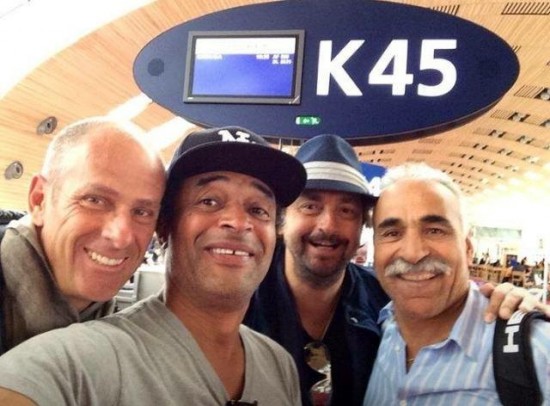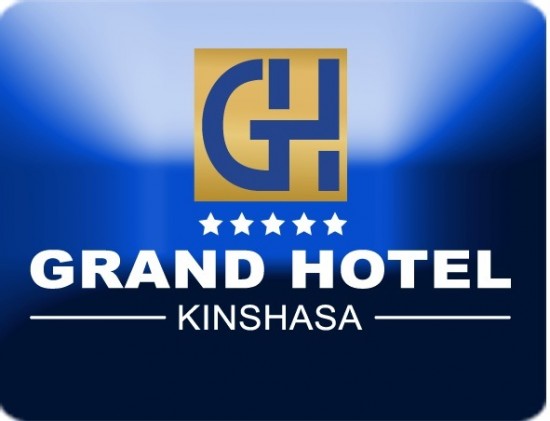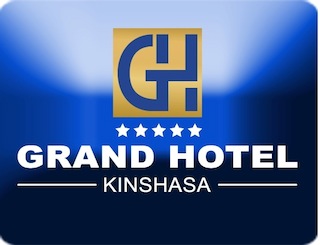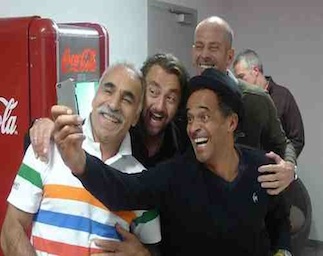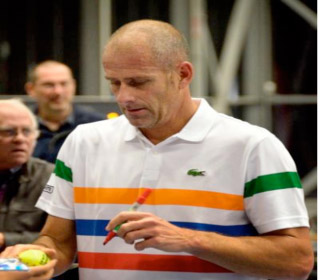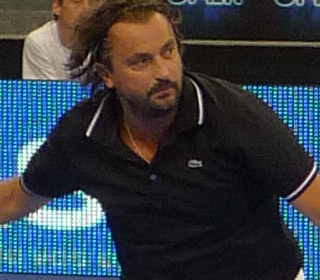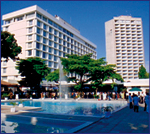
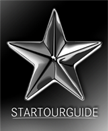
Kinshasa, DR Congo
Kinshasa (formerly French Léopoldville) ist he capital and the largest city of the Democratic Republic of the Congo. It is located on the Congo River. Once a site of fishing villages, Kinshasa is now an urban area with a 2013 population of over 9 million. It faces the capital of the neighbouring Republic of Congo, Brazzaville, which can be seen in the distance across the wide Congo River. The city of Kinshasa is also one of the DRC's 11 provinces. Because the administrative boundaries of the city-province cover a vast area, over 90% of the city-province's land is rural in nature, and the urban area only occupies a small section in the far western end of the city-province.
Kinshasa is the third largest urban area in Africa after Cairo and Lagos. It is also the second largest francophone urban area in the world after Paris, French being the language of government, schools, newspapers, public services and high-end commerce in the city, while Lingala is used as a lingua franca in the street. If current demographic trends continue, Kinshasa should surpass Paris in population around 2020. Kinshasa hosted the 14th Francophonie Summit in October 2012.
Residents of Kinshasa are known as Kinois (in French and sometimes in English) or Kinshasans (English).
Kinshasa has the largest population of any city proper in Africa with a population of 10,076,099, and ranks as its third largest metropolitan area. It is also the largest French-speaking city proper in the world (by any other measure, it still ranks second behind the Paris urban area). After decades of armed conflicts imposed by neighboring countries, the infrastructures of the once leading modern African city are now being remarkably restored. Chinese companies are involved in numerous projects of reconstruction throughout the city.
Go see the bonobos by Lac de ma Vallée, Chutes de Zongo in Bas Congo and Bombo Lumene on the road to Kikwit. A BBQ on a sandbank on the Congo River is definitely also a must. Renting a boat for a day with a driver and all the gear (tables, chairs, a suntent and a BBQ) will cost around 150$ at the Yacht Club Kinshasa. The boat can take 8 people, so if you share the cost it is quite affordable. A truly unforgettable experience.
Don't forget to get some arts in Le marché des valeurs, sometimes called marché des voleurs... the first calling means market of value, the second in changing only one letter means market of thieves. Be prepared to haggle and don't pay the initial asking price that will be at least 60-75% over the final price if not more. For some more upscale art you can go to the Academie des Beaux Arts on Avenue Pierre Mulele (formerly Avenue 24 Novembre) or to Symphonie des Arts: towards Kintambo on the Boulevard du 30 Juin, turn right after the elephant when you see the barrier on your right... then it's on your left hand accross from the big colonial villa. A more time consuming but far more interesting and personal way to get to know the artists of the country would be to visit their private studios. Prices are high even there for paintings of Lema Kusa, Henri Kalama or Nshole, but worth every penny considering the quality of their works and their international career.
A more relax and fun way to buy street art is to have a beer at Surcouf: it's on the street off the boulevard 30 Juin towards Justice off the INSS building. Sit at a table and have a drink (Primus is recommended) and the artists will come and show all kinds of artworks all the time. The same rule on negotiating applies as at Marché des valeurs.
The good supermarkets are the following: Peloustore located on the boulevard (big orange/yellow building with green letters). Good vegetables and all dry goods that you can find in Belgium. Expresse located on the boulevard, a little off from Peloustore. Here you can find good vegetables and the best "charcuterie", cold cutt meat? City Market If you turn on the corner of Expresse you will see this large supermarket on your left hand. It has the best bread in town. Alternatively across from it you will find excellent bread (and more) in Patisserie Nouvelle, which also has good lunch possibilities. Hasson et Freres located just off the roundabout near the central station: the street just before turning on the boulevard: this is definitly the best place to get your meat: the "filet pur" is the best meat you can get!
Local beer - Turbo King is a darker beer, regular lagers are Primus (which some feel is the best local beer, brewed by the local Heineken brewery) and Skol. European Mutzig comes in smaller bottles! A bit more expensive, and slightly harder to find as it is brewed in Lubumbashi by Simba Breweries, is Tembo, a tasty amber ale preferred by locals and expats alike. Tembo garners the highest ranking for a DRC beer on ratebeer.com. Lots of expensive French and South African wine available in restaurants and supermarkets. Portuguese plonk goes for as low as $3 a bottle at grocery stores catering to expats (Peloustore, Express, etc.).
Kinshasa becomes alive most nights when residents head to Matonge, a place filled with dancing bars, restaurants and night clubs. Lately Bandal and Bonmarche are the more popular "quartiers" to visit the local bars and "discotheques". Go to a local nightclub and learn how to dance Congolese rhythms. Get ready to shake your booty!
Do not drink from the tap. Bottled water is readily available. Also, when cleaning your teeth make sure that you use bottled water.
Don't drink the local water. Bottled water seems to be cheap enough but sometimes hard to find for a good price. The best way is if you are staying in an upscale hotel that provides it with the room .
Make sure you have all required vaccinations - i.e. yellow fever, typhoid, etc. Mosquitoes can be a problem in the entire city. Malaria medication should be taken.
When traveling by car, always lock all the doors before you set off, as it is not uncommon for opportunist thieves to try to open them and snatch belongings. For the same reason, keep bags and valuables out of reach and out of sight.
It is highly recommended that you have someone with you at all times that is a local (besides while being in your hotel). Taxi drivers will usually stay with you too when going to local shops and making quick stops and will serve as your translator if you get a good one. Be careful with any equipment you have with you such as digital cameras and video equipment. Be careful also of what you take pictures of. Even if they say no photos only at the airport and of government buildings, a lot of times the police and UN people will get upset if you are taking videos at other places where technically it is supposed to be ok to do. Just be sure to have plenty of locals with you that know what they are doing and can provide security and a way out if you get stuck or in trouble. Follow their advice and pay attention when out and about. When in doubt about taking a photo of something don't until you get very clear instructions that it is ok. Don't keep cameras in open view unless you've been cleared to take a photo. Also be equally prepared for hostility and positive reactions when taking photos.
If you are approached by people claiming to be police, be wary. If they are not in uniform, they are probably not police but are most likely hoping to relieve you of your money and valuables. A common tactic is for a group of men in a car to show a fake police identity card and ask you to go with them to the police station. Do not get in the car; just walk away. Be prepared to run. Never lose your temper, but keep negotiating in a friendly way; in the end, they will give up.
Recent road scams have included a group of fake police officers in an unmarked 4x4 vehicle that will pull over unsuspecting people driving alone in cars, then forcibly take them in to their vehicle, drive them out to the country, rob them of everything and leave them stranded. While the main targets have been UN staff in obvious white UN vehicles, all foreigners driving should be wary of this group or others operating like them. For general safety, people should never drive alone in vehicles, especially after dark.
Fun with Henri Leconte & Mansour Bahrami
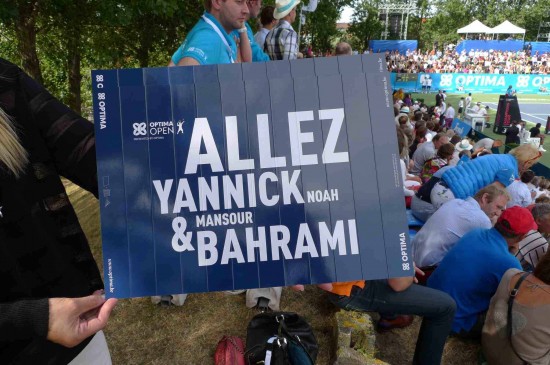
From 1 to 4 May 2014 , the tennis legends will compete as part of the first edition of GHK Legend Tower, the opportunity to see stars play at the Grand Hotel Kinshasa, in the heart of the capital.
Nostalgia and spirit of competition will be at the rendezvous. The Legend Tour Ghk host elite tennis legends .
Among them, Yannick Noah , Henri Leconte, Mansour Bahrami and Guy Forget. Invite your buisness partner or friends to a legendary tennis tournament in a relaxed atmosphere. The Legends play on the center court of the Grand Hotel Kinshasa specially designed to accommodate 1,000 spectators per day. You will have a breathtaking view of the court. VIP club: You will have the opportunity to spend special moments in the presence of these legends. Toast with champagne, enjoy a delicious lunch and watch tennis matches in an exceptional setting .
Le rendez-vous incontournable du sport et du divertissement. Du 01 au 04 Mai 2014, des légendes du tennis s’affronteront dans le cadre de la première édition du GHK Legend Tour, l’occasion de voir jouer des stars au Grand Hôtel Kinshasa, en plein cœur de la capitale.
Nostalgie et esprit de compétition seront au rendez-vous. Le Ghk Legend Tour accueillera l’élite des légendes du tennis.
Yannick Noah, Henri Leconte, Mansour Bahrami et Guy Forget. Invitez vos relations à un tournoi de tennis légendaire dans une ambiance décontractée. Les légendes joueront sur le court central du Grand Hôtel Kinshasa spécialement aménagé pour accueillir 1000 spectateurs par jour.
Installé dans la tribune VIP tout confort, vous aurez une vue imprenable sur le court. Au club VIP, vous aurez tout le loisir de passer des moments exceptionnels en présence de ces légendes. Trinquez au champagne, dégustez un délicieux déjeuner et assistez à des matchs de tennis de haut niveau dans un cadre exceptionnel.
